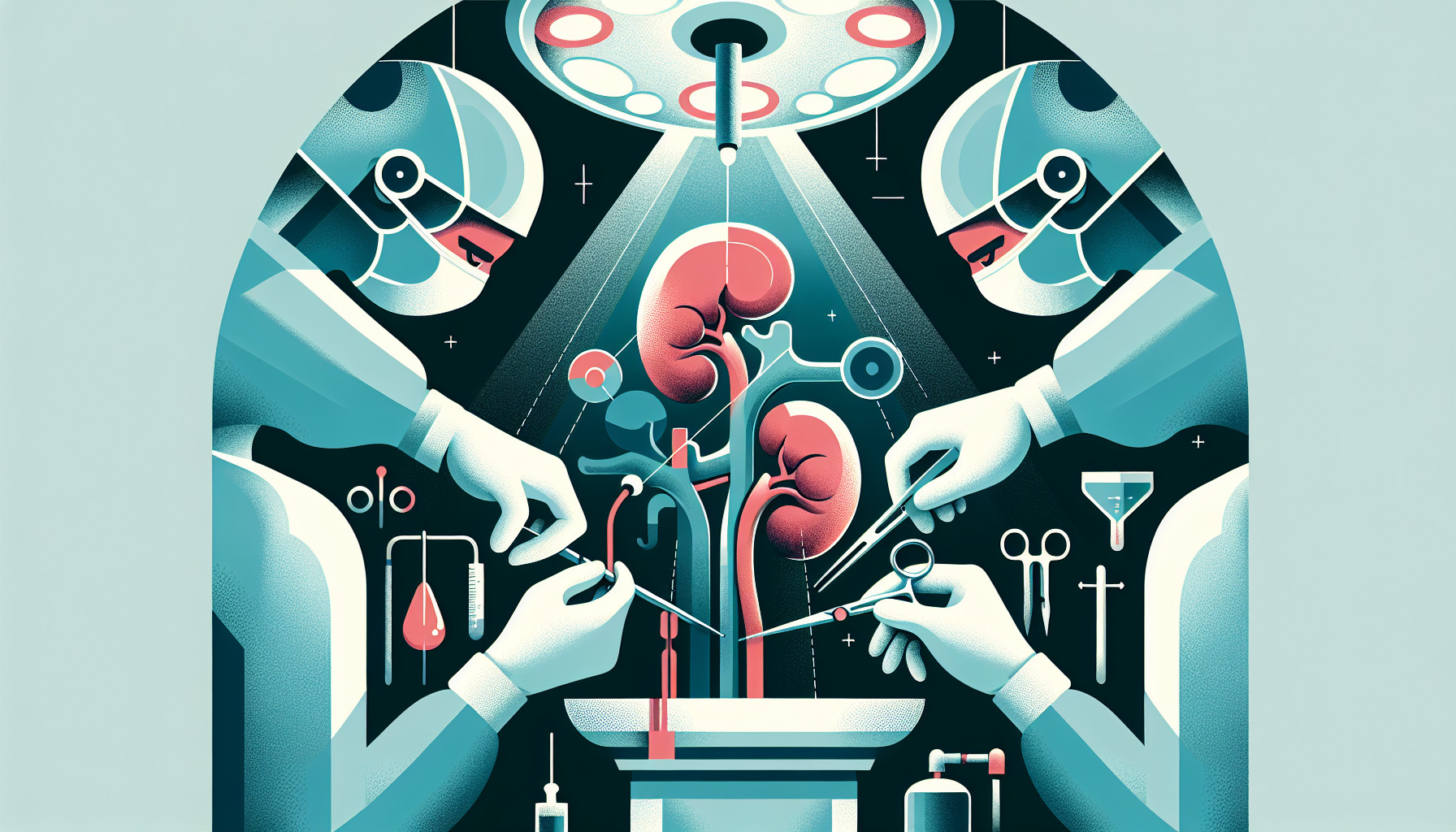Our Summary
This research paper is a review of 18 clinical trials comparing two types of surgery for large kidney tumors (>7 cm): laparoscopic radical nephrectomy (LRN), a minimally invasive procedure, and open radical nephrectomy (ORN), a traditional open surgery.
The study found that the LRN procedure took longer to perform but had several advantages over the ORN. Patients who underwent LRN lost less blood during surgery, had less need for blood transfusions, and had shorter hospital stays.
However, when it came to survival rates and the likelihood of cancer coming back, there was no statistical difference between the two procedures. This suggests that both types of surgery are equally effective in treating large kidney tumors.
In conclusion, LRN has some benefits over ORN in terms of recovery, but the surgery itself may take longer. The choice between the two procedures would depend on specific patient conditions and surgical expertise.
FAQs
- What are the main differences between laparoscopic radical nephrectomy (LRN) and open radical nephrectomy (ORN)?
- Are there any significant differences in survival rates and recurrence of cancer between patients who undergo LRN and ORN?
- How does the choice of surgery, between LRN and ORN, depend on specific patient conditions and surgical expertise?
Doctor’s Tip
A doctor may advise a patient undergoing laparoscopic nephrectomy to follow their post-operative care instructions closely to ensure a smooth recovery. This may include taking prescribed medications, following a specific diet, getting enough rest, and avoiding strenuous activities. It is also important to attend follow-up appointments to monitor healing and address any concerns.
Suitable For
Patients who are typically recommended for laparoscopic nephrectomy include those with large kidney tumors (>7 cm) who are otherwise healthy and able to tolerate the minimally invasive procedure. Additionally, patients who are concerned about cosmetic outcomes, shorter hospital stays, and faster recovery times may also be good candidates for laparoscopic nephrectomy. However, the decision to undergo laparoscopic nephrectomy should be made on a case-by-case basis, taking into consideration the patient’s overall health, the size and location of the tumor, and the surgeon’s expertise in performing the procedure.
Timeline
Before the laparoscopic nephrectomy procedure, a patient would typically undergo a series of tests and evaluations to determine the size and location of the kidney tumor, as well as their overall health and suitability for surgery. They would also meet with their healthcare team to discuss the procedure, potential risks and benefits, and any necessary preparations.
During the laparoscopic nephrectomy procedure, the patient would be placed under general anesthesia and small incisions would be made in the abdomen to allow for the insertion of a laparoscope and other surgical instruments. The surgeon would then remove the affected kidney and any surrounding tissue as needed.
After the laparoscopic nephrectomy procedure, the patient would be closely monitored in the recovery room for a period of time before being transferred to a hospital room. They would be given pain medication as needed and encouraged to get up and walk around to promote healing and prevent complications.
In the days following the laparoscopic nephrectomy, the patient would gradually increase their activity level and begin a gradual return to normal activities. They would have follow-up appointments with their healthcare team to monitor their recovery and address any concerns or complications that may arise.
Overall, the timeline of a patient’s experience before and after laparoscopic nephrectomy would involve preparation, surgery, recovery, and follow-up care to ensure a successful outcome.
What to Ask Your Doctor
What are the potential risks and complications associated with laparoscopic nephrectomy compared to open nephrectomy?
How long is the recovery time after laparoscopic nephrectomy and what can I expect during the recovery process?
Will I need to stay in the hospital after the surgery and for how long?
How experienced are you in performing laparoscopic nephrectomy procedures?
What is the success rate of laparoscopic nephrectomy in treating large kidney tumors compared to open nephrectomy?
Will I need any additional treatments or follow-up care after the surgery?
Can you explain the differences in terms of pain management and scarring between laparoscopic nephrectomy and open nephrectomy?
Are there any specific lifestyle changes or precautions I should take after undergoing laparoscopic nephrectomy?
How will this surgery affect my kidney function and overall health in the long term?
Are there any alternative treatment options for my kidney tumor that I should consider before deciding on laparoscopic nephrectomy?
Reference
Authors: Wang L, Li KP, Yin S, Yang L, Zhu PY. Journal: World J Surg Oncol. 2023 Feb 6;21(1):35. doi: 10.1186/s12957-023-02916-y. PMID: 36747217
